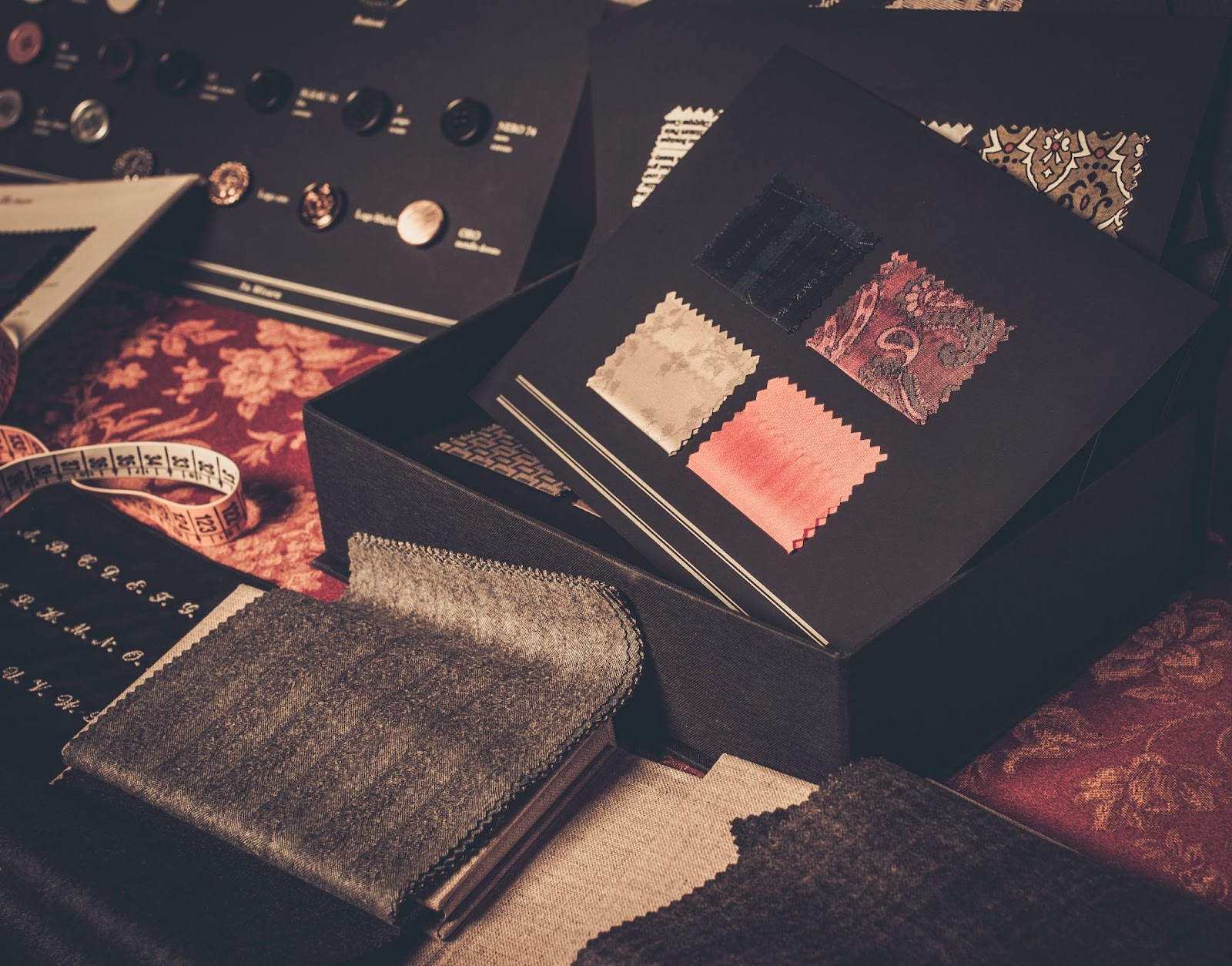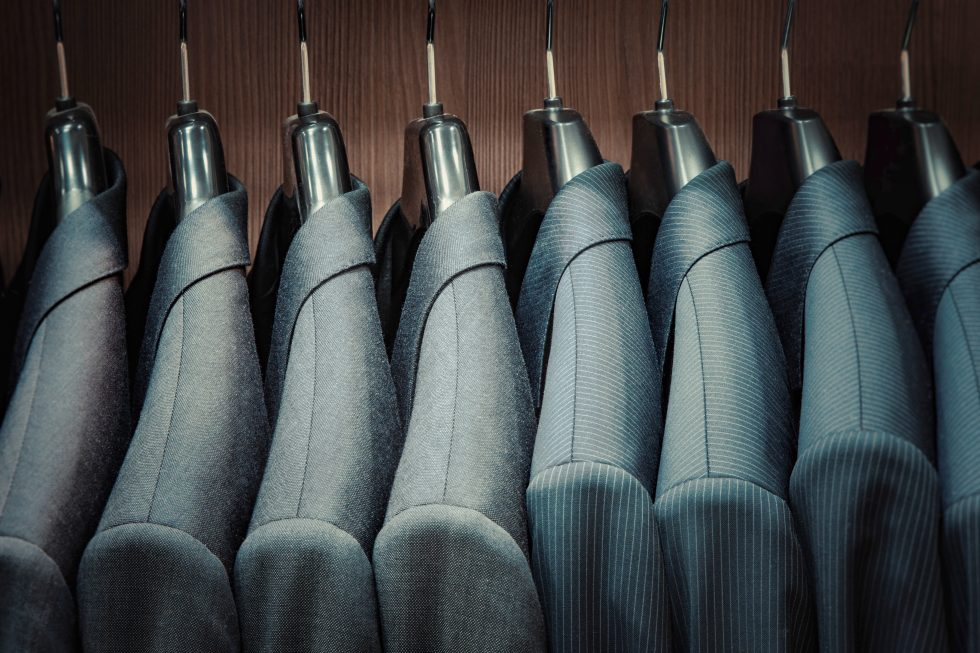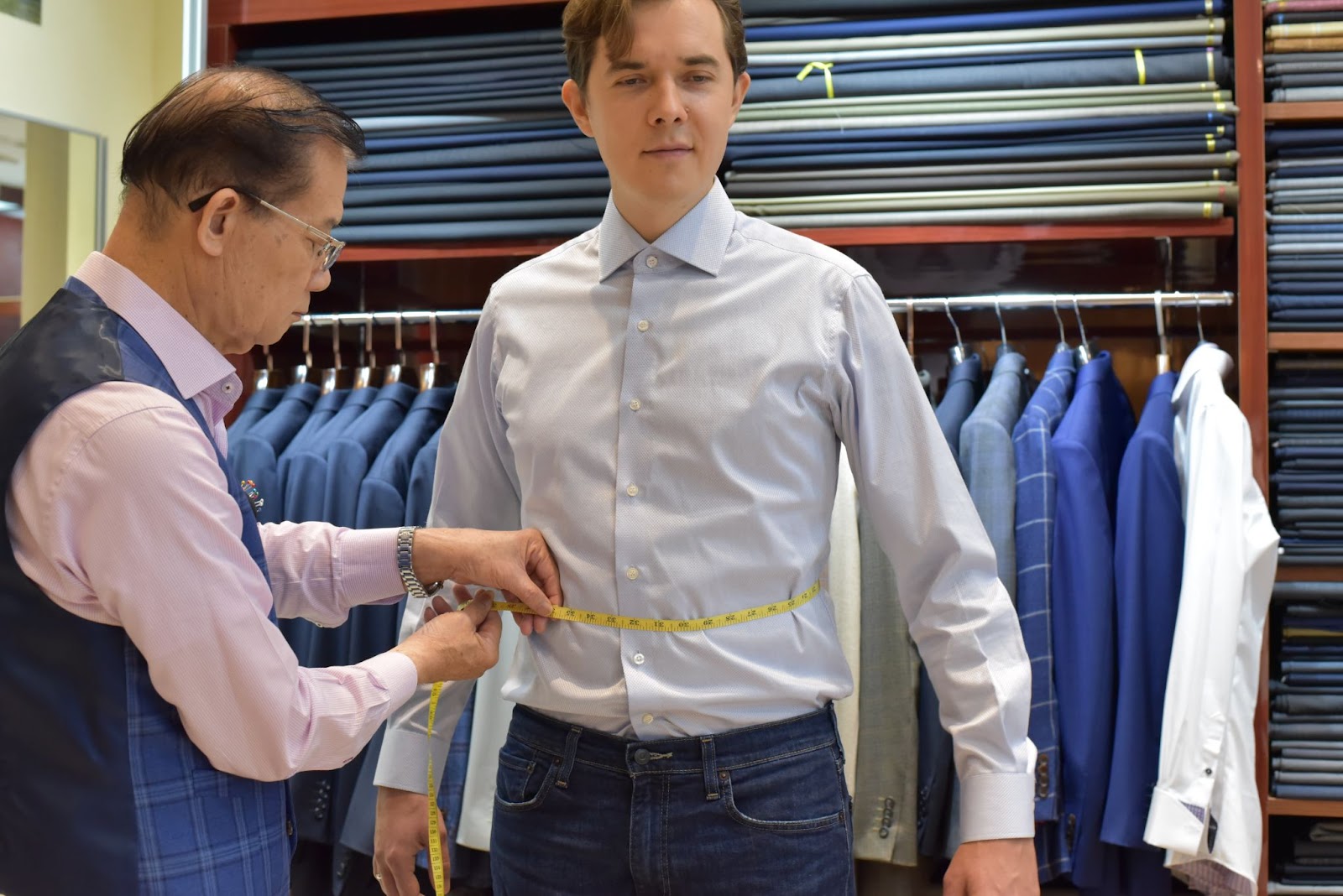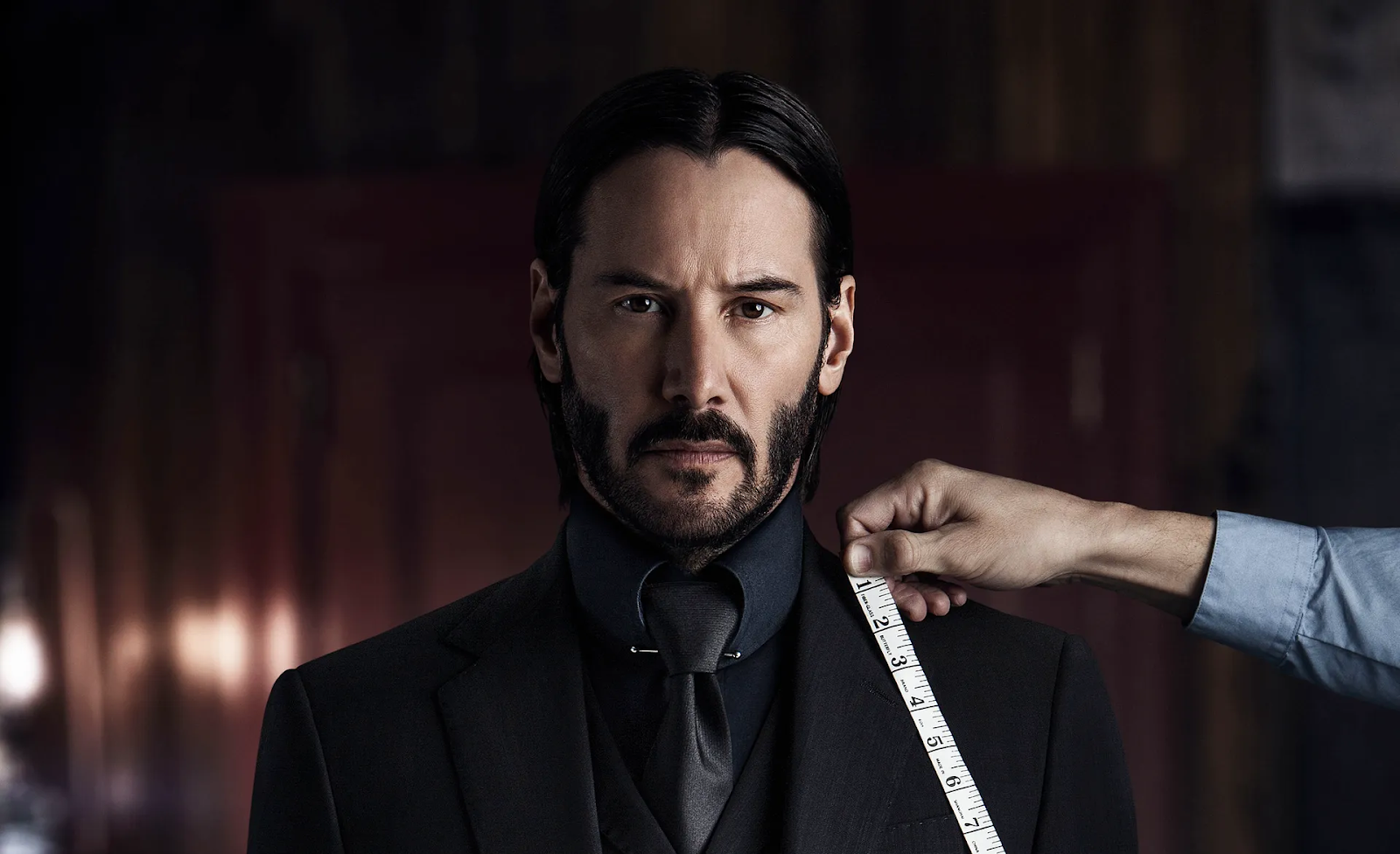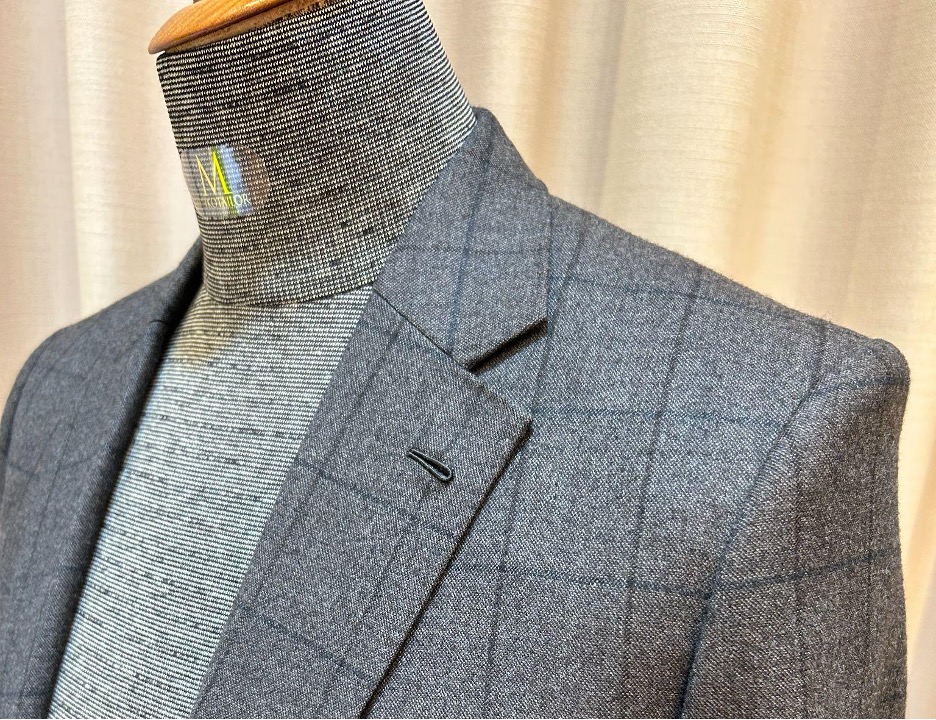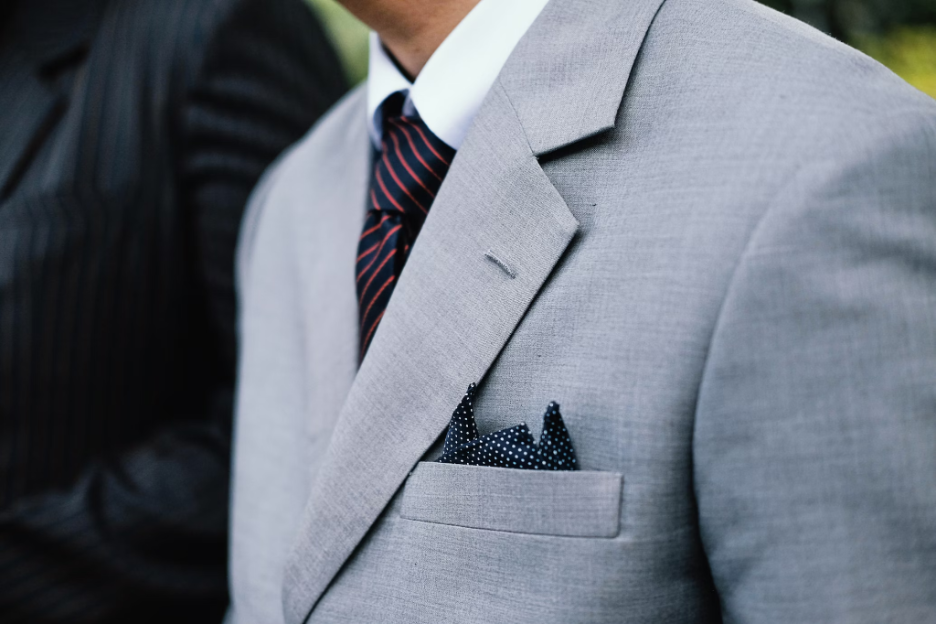When commissioning a bespoke suit, choosing the right fabric is as important as selecting the right tailor. The right fabric determines not only the suit’s durability and comfort but also its overall style and appearance.
With countless suiting fabrics available, the decision can be overwhelming. But don’t worry—our guide is here to make the process easier. Here’s a rundown of key considerations and fabric types to help you make an informed choice:
What Suit Fabric Should You Choose for Your Bespoke Suit?
Hence, it’s important to know what you need first and consider based on these aspects:
Comfortability
Comfort is paramount when selecting a suit fabric for your bespoke suit. Choose a material that feels good against your skin and allows for ease of movement.
Fabrics like wool and cotton are often chosen for their comfort as they’re soft and breathable. Breathability is important when it comes to suits. You wouldn’t want to wear a bespoke suit that’s stuffy.
A bespoke suit that isn’t breathable will trap in sweat and cause body odour. Which can be unpleasant especially in a hot climate like Singapore.
If a suit fabric feels scratchy, overly stiff, or stuffy, it might not be the best choice for you.
Durability
Durability determines how long your bespoke suit will last with regular use. Wool is known for its resilience and can withstand frequent wear without losing its shape.
Conversely, delicate fabrics such as silk may lack durability. They show signs of wear more quickly.
Are you someone who wears suits every day, or only on special occasions? Consider how often you’ll wear the suit and choose a fabric that holds up well.
A premium-quality suit fabric with excellent durability will give you a bespoke suit that lasts for decades.
Practicality
Take into consideration how practical the suit fabric is for your lifestyle. If you need a bespoke suit for everyday wear, opt for fabrics that are easy to care for and versatile.
Wool and blended fabrics are often practical as they require minimal maintenance. Fabrics like linen, while breathable, may crease easily and require more frequent attention.
Bespoke suits that need minimal maintenance save you time. You can wear them often without worry. Plus, you won’t have to stress about wrinkles or your suit not looking its best.
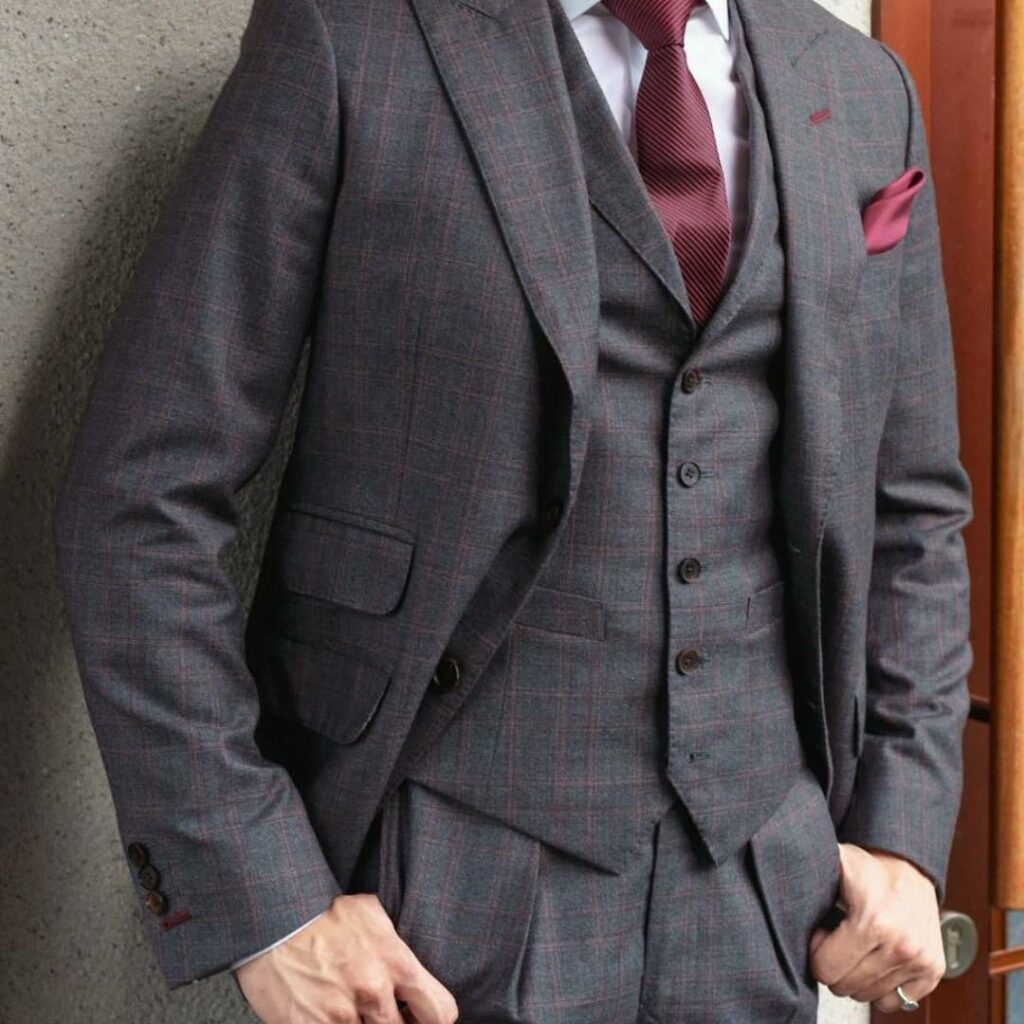
Style and Trend
The fabric you choose should align with your style preferences and current fashion trends. Classic fabrics like wool are always in style, while patterns and textures can add a modern touch.
If you prefer a timeless look, stick with solid colours and traditional fabrics. However, if you’re a fashion-forward individual who likes to make a statement, explore patterned fabrics and trendy textures.
Occasion
Dress for the occasion—by that, we mean the right occasion. Think about when you’ll wear your bespoke suit. For formal events, opt for classic fabrics like wool or silk with subtle patterns.
If you need a suit for casual or semi-formal settings, cotton or linen might be more suitable. The fabric should match the formality of the event and your personal style.
Remember, dressing your best at the wrong occasion can still make you look tacky.
Season
The season has a huge influence on fabric selection. Wool suits are versatile and can be worn year-round, while lighter fabrics like linen are ideal for warmer months.
Heavier fabrics such as tweed or flannel are ideal for colder climates or winter seasons. If you’re planning to travel to countries with colder climates, heavier suit fabrics would be ideal for your bespoke suit.
In countries where there are no distinct seasons and it is summer all year round, like Singapore, natural fibers like linen, hopsack (blend of wool and cotton), seersucker can be suitable for suits too, especially for tropical weather like Singapore. For business wear,
Wool and wool blends have been the go-to in men’s suiting. Opt for lightweight virgin wool from reputable fabric mills like Loro Piana, Drago, Zegna, Reda. If budget allows, go for the merino wool, as it is thinner and softer than regular wool and can keep you cool by wicking away moisture when it’s hot. There are also beautiful fabrics and textures that are suitable for suits too.
Budget
Your budget will influence your fabric choice. High-quality fabrics like silk and fine wool can be more expensive, while synthetic options are often more affordable. Take your budget into account and strike a balance between quality and cost.
Though budget is a factor, don’t let it be the main determining aspect in your decision-making. Keep in mind that investing in good suit fabric can enhance the overall look and longevity of your bespoke suit.
If you have the budget, it’s better to have one or two versatile bespoke suits made from quality fabric in your wardrobe, rather than several cheaper ones that last only two to three years.
Maintenance
Different suit fabrics require varying levels of care. Wool suits generally need occasional dry cleaning. Linen, on the other hand, may require regular pressing to maintain a crisp appearance.
Synthetic fabrics are usually low-maintenance and resistant to wrinkles. Though that’s the case, synthetic suits are less comfortable and not very durable for frequent wear.
Think about how much effort you’re willing to put into maintaining your suit and choose a fabric that fits your lifestyle.
Once you know what you need in a bespoke suit, the fabric selection process will be much easier. When that’s settled, it’s time to move on to the next phase of selection.
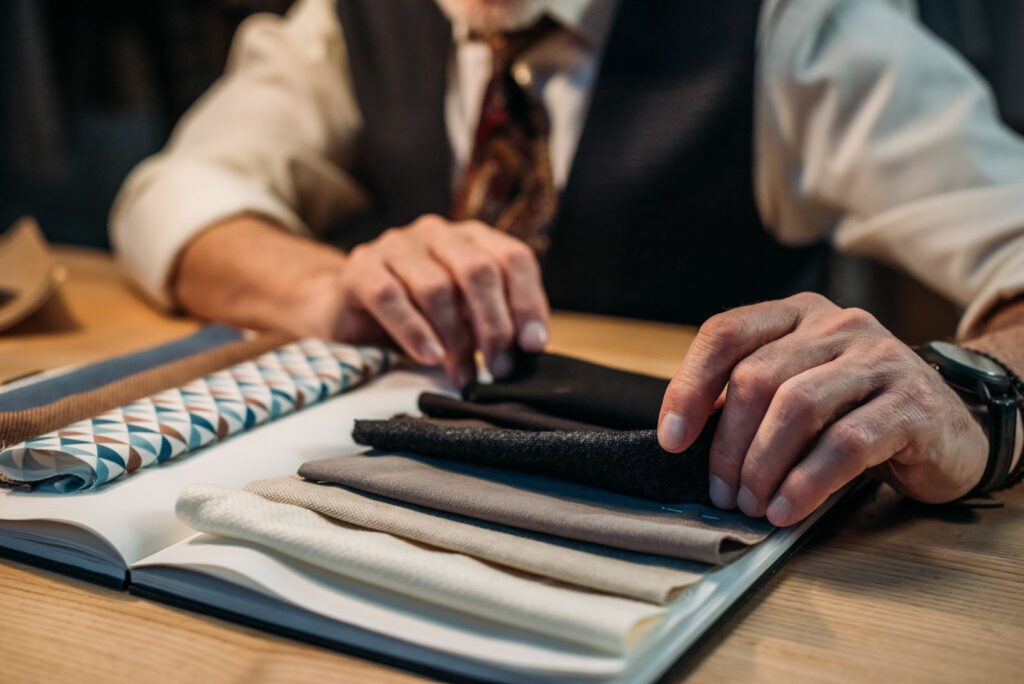
Understanding Fabric Weight and Weave
The next step in selecting the best suit fabric for your bespoke suit is understanding fabric weight and weave. Both factors are significant. They affect how your suit looks and feels.
Fabric Weight
1. Very Light (<136 gsm or <4 oz)
Characteristics
Fabrics in this weight category are ultralight and often used for specialty suits. They offer minimal insulation. Plus, they are designed to be highly breathable and comfortable in very warm conditions.
Suitability
They’re ideal for summer suits or high-fashion styles where a lightweight and airy feel is desired. These fabrics are not typically suited for everyday wear or cooler climates, as they provide little warmth.
2. Light (136-237 gsm or 4-7 oz)
Characteristics
Light fabrics are perfect for summer and casual suits. They offer good breathability and a relaxed drape, making them comfortable for warmer weather while maintaining a casual appearance.
Suitability
These suit fabrics are excellent for spring and summer events. They’re also perfect for climates that remain mild throughout the year. Suits made from these fabrics offer a breezy feel, making them ideal for less formal settings and occasions.
3. Medium (237-305 gsm or 7-9 oz)
Characteristics
Medium-weight fabrics strike a balance between lightness and structure. They provide a versatile option for most seasons and are suitable for a wide range of suit styles.
Suitability
Medium-weight fabrics are a standard choice for everyday business suits. Additionally, they’re versatile enough for both formal and semi-formal occasions. Fabrics with this weight offer a classic, structured look with adequate comfort in moderate temperatures.
4. Heavy (>305 gsm or >9 oz)
Characteristics
Heavy fabrics are thicker and more robust. They provide substantial warmth and a structured appearance. These fabrics are less flexible but offer excellent durability and a distinguished look.
Suitability
Suit fabrics with this weight are ideal for winter suits or for climates where additional insulation is necessary. Heavier fabrics like flannel or tweed provide a classic, tailored look suited to formal events or colder weather. They keep you warm and looking stylish.
Importance of Fabric Weight in Suit Selection
Warmth and Insulation
Heavier fabrics offer more insulation, making them suitable for colder environments or winter wear. Conversely, lighter fabrics are designed to keep you cool in hot climates.
Drape and Structure
The weight of the fabric affects how the suit drapes and fits. Heavier fabrics tend to create a more structured silhouette, while lighter fabrics offer a softer, more relaxed drape.
Comfort and Practicality
Choosing the right fabric weight ensures your suit is comfortable for the intended season, climate, and occasion. Consider how the fabric will feel throughout the day and whether it meets your needs for both function and style.
When selecting the fabric for your bespoke suit, understanding the impact of fabric weight helps you choose a material that aligns with your lifestyle and preferences.
Whether you need a lightweight option for a hotter climate or a heavyweight fabric for your travels in winter, selecting the appropriate weight ensures your suit will be both comfortable and stylish.
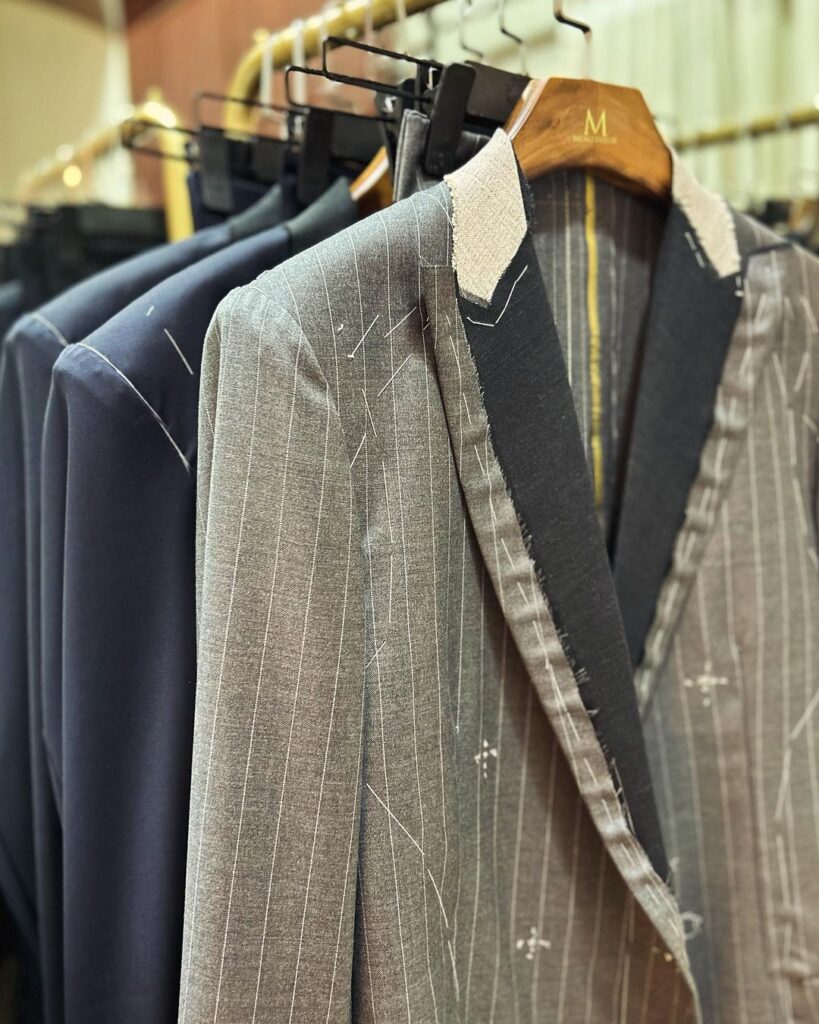
Fabric Weave
The weave of a suit fabric impacts its texture, appearance, and breathability. A tighter weave results in a smoother finish, perfect for formal occasions.
Common Weaves and Their Characteristics
Plain Weave
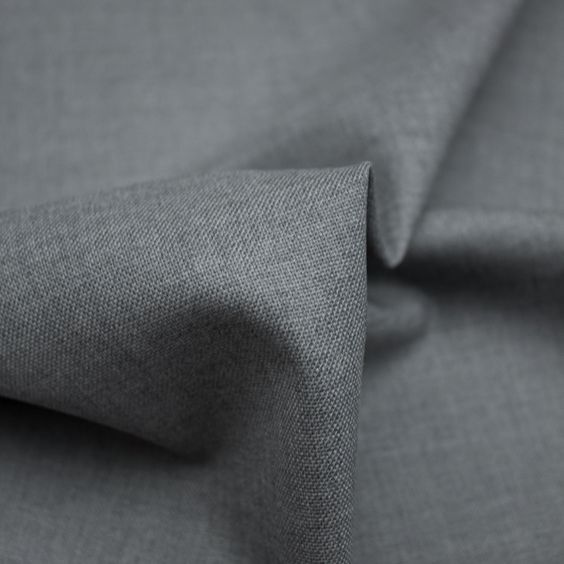
This basic weave has a straightforward over-and-under pattern, resulting in a smooth surface with a subtle texture. It offers a light drape and good breathability, making it ideal for classic, formal suits, especially in warmer climates.
Twill Weave
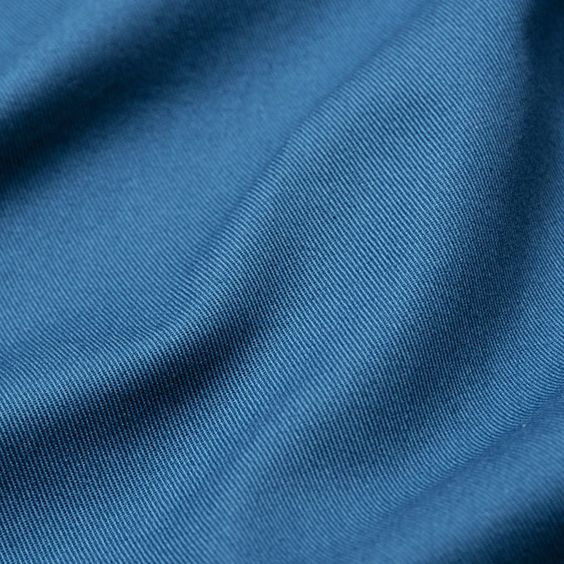
Recognised by its diagonal pattern, twill has a distinct texture and a slight sheen. It provides a heavier drape and a more structured look, perfect for suits that require a formal and polished appearance.
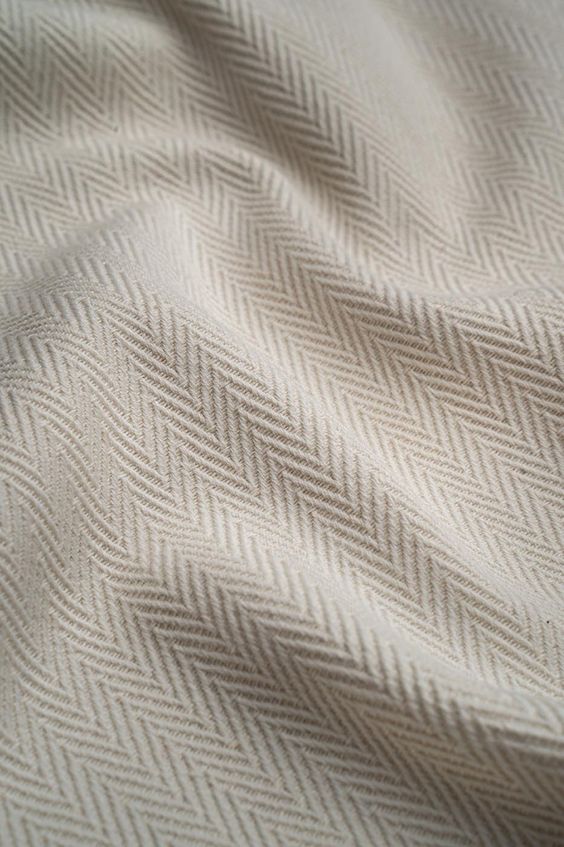
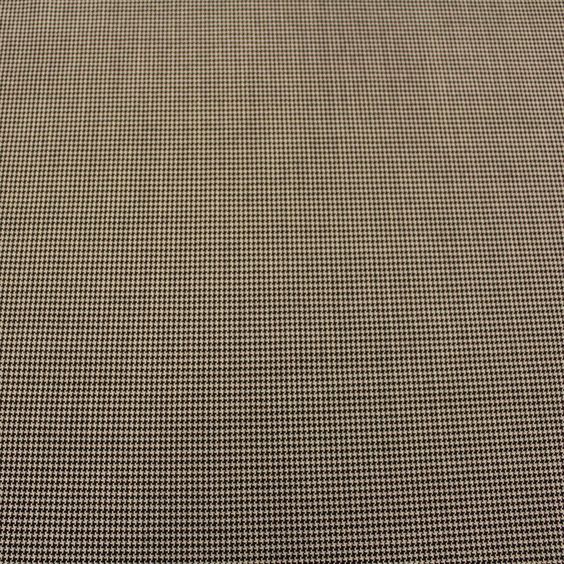
Herringbone and Houndstooth Weaves
Both are variations of twill. Herringbone has a zigzag pattern that adds elegance, while houndstooth offers a bold, chequered design. Both provide a balanced drape and are suitable for versatile, semi-formal suits.
Additional Weaves
- Satin Weave: Smooth and lustrous, ideal for formalwear.
- Hopsack Weave: Breathable with a textured, open weave, perfect for casual suits.
- Basket Weave: Robust with a slightly textured finish, often used in heavier fabrics.
- Gabardine Weave: Tightly woven, durable, and wrinkle-resistant, suitable for everyday wear.
- Birdseye Weave: Subtle, dotted texture that adds depth without overwhelming.
- Sharkskin Weave: Sleek with a slight sheen, giving a refined look.
- Barathea Weave: Ribbed texture, commonly used in evening wear.
- Seersucker Weave: Puckered texture, lightweight and breathable, ideal for summer suits.
Importance of Weave in Suit Fabric Selection
Texture and Aesthetics
The weave affects the fabric’s surface texture and overall look. Choose a weave that aligns with the intended style of your bespoke suit. For a refined, classic appearance, plain weaves are ideal. For added sophistication and interest, twill or herringbone weaves are excellent choices.
Drape and Fit
The way a fabric drapes can impact the fit and silhouette of your suit. Heavier weaves like twill and herringbone provide a more structured look. Lighter weaves like plain weave offer a more relaxed drape. Consider the fit you desire and how the fabric’s drape will influence it.
Functionality and Comfort
Weave patterns affect the fabric’s breathability and overall comfort. Ensure the chosen weave aligns with your needs for both the season and the suit’s intended use. For summer suits or in a warmer climate like Singapore, lighter and more breathable weaves are preferred. On the other hand, heavier weaves are better suited for cooler weather or places.
Texture and Aesthetics
The weave affects the fabric’s surface texture and overall look. Choose a weave that aligns with the intended style of your bespoke suit. For a refined, classic appearance, plain weaves are ideal. For added sophistication and interest, twill or herringbone weaves are excellent choices.
Drape and Fit
The way a fabric drapes can impact the fit and silhouette of your suit. Heavier weaves like twill and herringbone provide a more structured look. Lighter weaves like plain weave offer a more relaxed drape. Consider the fit you desire and how the fabric’s drape will influence it.
Functionality and Comfort
Weave patterns affect the fabric’s breathability and overall comfort. Ensure the chosen weave aligns with your needs for both the season and the suit’s intended use. For summer suits or in a warmer climate like Singapore, lighter and more breathable weaves are preferred. On the other hand, heavier weaves are better suited for cooler weather or places.
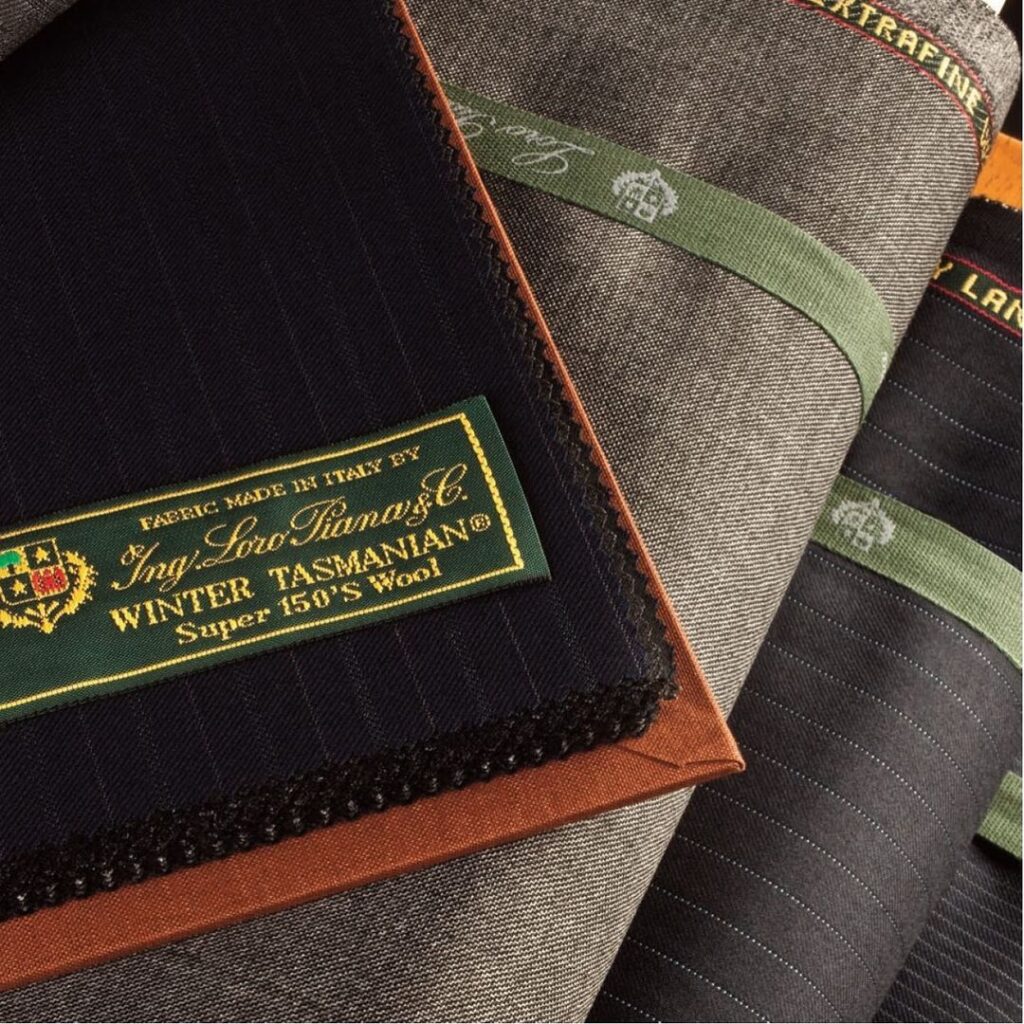
Popular Suit Fabrics You Should Know
Wool
Wool is the most versatile and widely used fabric for bespoke suits. Here’s why it stands out:
Breathability
Wool naturally wicks moisture, making it comfortable in both warm and cool conditions.
Wrinkle Resistance
Wool fibres have natural elasticity, allowing the fabric to bounce back and resist wrinkles.
Variety
Wool comes in several types, including worsted wool, merino wool, and flannel, offering options for different seasons and styles. Worsted wool, for instance, is tightly spun, resulting in a smooth, durable finish, perfect for formal suits.
Cotton
Cotton suits offer a comfortable and breathable alternative for those who prefer a more relaxed style.
Comfort
Cotton is soft and has a natural stretch, making it comfortable for long wear.
Casual Vibe
Cotton suits tend to have a matte finish, offering a more laid-back appearance compared to the sheen of wool or silk. This makes them great for casual or semi-formal settings.
Seasonal Suitability
While suitable for summer or in a warmer climate, cotton is not the best for cold weather due to its limited insulation.
Linen
Linen is renowned for its lightness and breathability, making it a top choice for summer suits.
Airiness
Linen’s loose weave allows for excellent airflow, keeping you cool in hot weather.
Natural Texture
Linen has a distinctive texture that adds character to your suit. It has a slightly rougher feel and a natural crumple, giving it a relaxed, effortless look.
Creasing
Although linen wrinkles easily, some wearers embrace this as part of the fabric’s charm. If you’re seeking a more polished appearance, consider linen blends that offer the benefits of linen with reduced creasing.
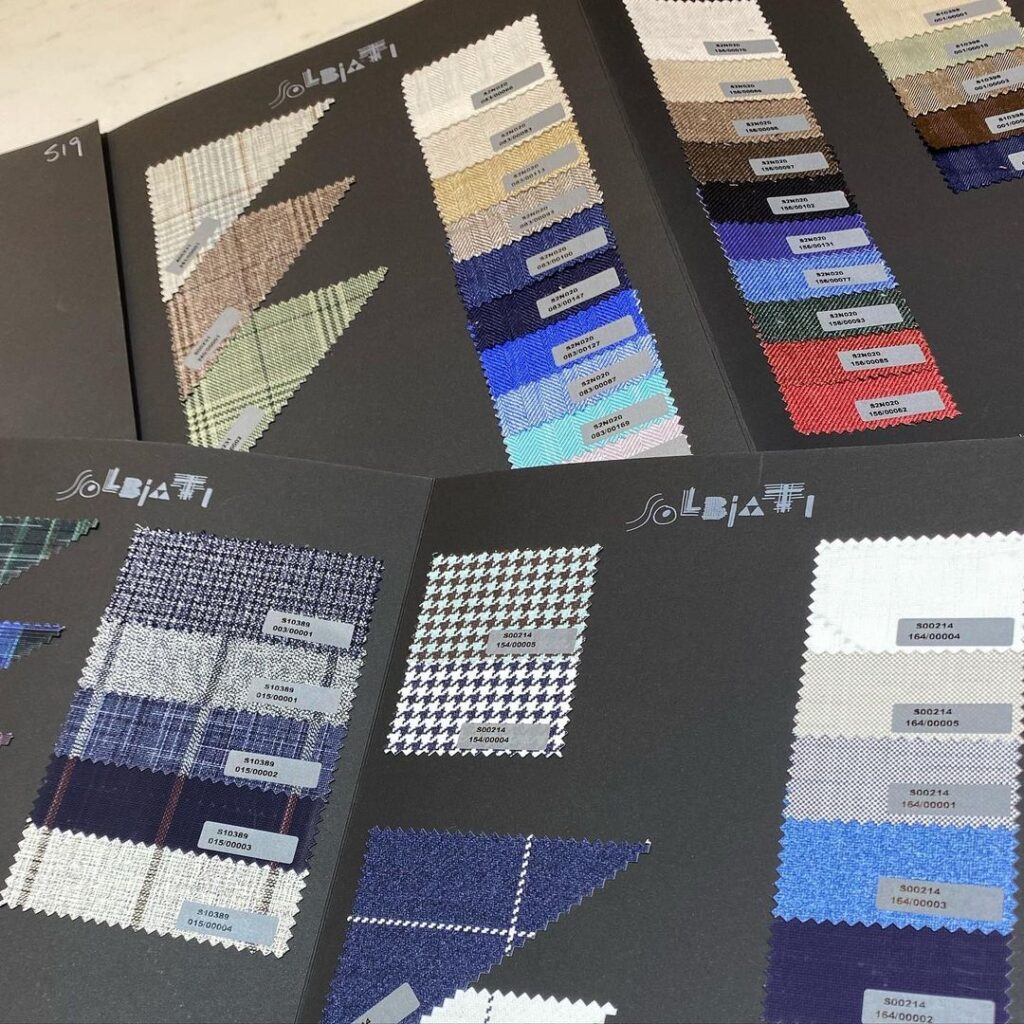
Silk
Silk is synonymous with luxury and elegance.
Natural Sheen
Silk offers a unique lustre, which catches the light and creates a sophisticated, high-end look.
Lightweight and Smooth
Silk is incredibly lightweight, with a smooth, soft texture that feels luxurious against the skin.
Blending
Pure silk suits are rare due to their delicate nature. More often, silk is blended with wool to add shine and enhance durability while maintaining the luxurious feel.
Tweed
Tweed is a classic choice for winter suits, offering warmth and durability.
Insulation
Tweed is thick and tightly woven, providing excellent warmth in cold climates.
Classic British Style
Tweed has long been associated with traditional British fashion. It often features subtle patterns like houndstooth, checks, or herringbone, giving the suit a timeless and sophisticated edge.
Versatility
Although tweed is a heavyweight fabric, modern variations are available in lighter weights. This broadened its use beyond strictly winter wear.
Corduroy
Corduroy is a distinctive fabric characterised by its ribbed texture, offering a combination of warmth, comfort, and durability.
Texture
The signature ridges or “wales” give corduroy a textured, almost three-dimensional look. This adds a playful yet vintage vibe to suits.
Warmth
Corduroy is a heavier fabric, making it ideal for autumn and winter. It’s a go-to for casual suits with a touch of personality.
Style Versatility
While not typically associated with formalwear, corduroy suits can be styled creatively for semi-formal events or smart-casual occasions.
Mohair
Mohair is sourced from the Angora goat. It’s known for its luxurious sheen and durability.
Sheen and Texture
Mohair has a natural lustre that gives suits an elegant and slightly shiny appearance. The fibres are smooth, adding a refined finish to any outfit.
Durability and Resilience
Mohair is also renowned for its strength and ability to retain shape. This makes it ideal for suits that need to withstand regular wear. It’s also resistant to wrinkles, adding to its practical appeal.
Breathability
Despite being robust, mohair is lightweight and breathable. They ensure comfort in various climates. This fabric is a versatile choice for both summer and winter suits, as it provides warmth without overheating.
Blending
Pure mohair can be quite stiff, so it’s often blended with wool to enhance comfort while maintaining its luxurious qualities.
Synthetics (Like Polyester, Viscose, Rayon)
Synthetic fabrics have become more popular due to their affordability, versatility, and ease of care.
Affordability
Polyester and other synthetics are budget-friendly options compared to natural fibres like wool or silk.
Durability and Maintenance
Synthetic fabrics are often more resistant to wrinkles, shrinking, and fading, making them low-maintenance options for everyday suits.
However, with regular wear, these fabrics typically last only a couple of years compared to natural fibres, which can hold up better over time.
Additionally, synthetic fabrics may not offer the breathability or luxurious texture of natural materials. This leads to less comfort, especially in warmer climates.
Blended Fabrics
Polyesters are frequently blended with natural fibres to create fabrics that balance comfort, breathability, and affordability.
For example, polyester wood blends offer a more accessible price point while retaining some of the qualities of wool. Such as warmth and texture, with added durability.
Even so, these blends may sometimes compromise on the luxurious feel and natural breathability of pure wool. This makes them less suitable for those seeking the highest quality of suit fabric for their custom-tailored suit.
The Role of Fabric Finishing
Fabric finishing plays a crucial role in determining the texture, sheen, and durability of your bespoke suit. Options like Super 130s, 150s or Super 200s indicate the fineness of wool fibres.
Higher numbers offer a softer and smoother feel. However, while finer wool delivers a luxurious finish, it’s often more delicate. So, it’s best to consider how frequently you’ll wear the suit when selecting the finishing.
Considering Colour and Pattern
Choosing the right fabric also involves selecting the colour and pattern. For business settings, solid colours like navy, grey, or black are timeless choices.
If you’re after a more distinctive look, consider plaids, stripes, or herringbone patterns. The fabric colour should complement your skin tone and the occasions you’ll wear the suit to.
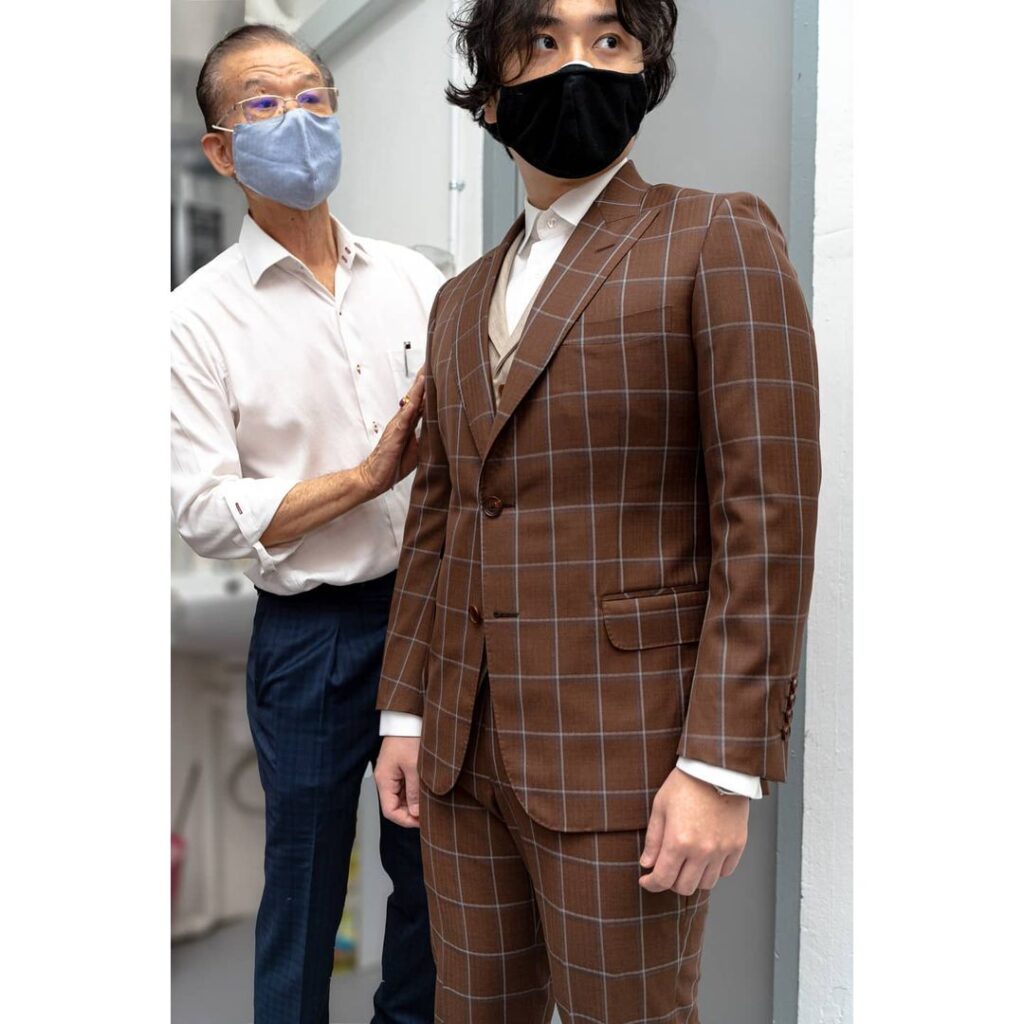
Making the Right Choice
Selecting the right fabric is key to a well-fitting, stylish, and comfortable bespoke suit. Understanding your preferences and needs will guide you to the fabric that best complements your lifestyle and personal style.
Consult with Your Tailor: If you’re still unsure, consult your tailor! A skilled tailor can provide recommendations based on your needs and preferences.
Consider Fabric Samples: Request swatches to feel and see the fabric before making a decision. While premium suit fabrics may come with a higher price tag, investing in high-quality materials is a worthwhile choice if your budget permits. A well-made bespoke suit from premium suit fabric offers superior durability, comfort, and longevity.
Think Long-Term: Invest in a high-quality fabric that aligns with your lifestyle and the suit’s intended use. It’s better to invest in one versatile, quality suit that will withstand frequent wear rather than purchasing multiple cheaper suits that may not last. In the long run, a suit made from high-quality fabric is an investment in both style and performance.
By keeping these considerations in mind, you’ll be well on your way to selecting a fabric that not only meets your style and comfort needs but also ensures a timeless, well-crafted bespoke suit.
Conclusion
At Meiko Tailor, we offer a range of premium suit fabrics. They’re meticulously chosen to withstand Singapore’s climate while delivering exceptional style and durability. From versatile wool and breathable linen to luxurious cashmere, our fabrics are designed to meet your every need.
Investing in top-quality suit fabric not only enhances your appearance but also boosts your confidence and comfort. When you’re ready to bring your bespoke suit vision to life, visit us. We’re here to guide you through the process.
Contact us today if you have any inquiries or wish to book an appointment. Elevate your wardrobe with a suit tailored to perfection!
Keen to learn more? Visit our blog section for additional insights.


